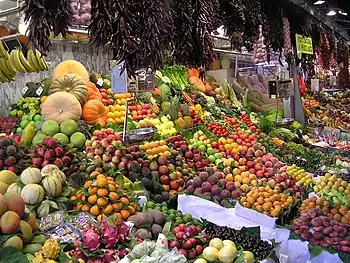Produce
Produce is a generalized term for many farm-produced crops, including fruits and vegetables (grains, oats, etc. are also sometimes considered produce). More specifically, the term produce often implies that the products are fresh and generally in the same state as where and when they were harvested.


In supermarkets, the term is also used to refer to the section of the store where fruit and vegetables are kept. Produce is the main product sold by greengrocers (UK, Australia) and farmers' markets. The term is widely and commonly used in the U.S. and Canada, but is not typically used outside the agricultural sector in other English-speaking countries.
In parts of the world, including the U.S., produce is marked with small stickers bearing price look-up codes. These four- or five-digit codes are a standardized system intended to aid checkout and inventory control at places where produce is sold.
Storage
Vegetables are optimally stored between 0° and 4.4 °C (32 and 40 °F) to reduce respiration. Generally, vegetables should be stored at a high humidity (80 and 95 percent relative humidity), but cucurbits (squash family) and onions prefer dry and can mold when moisture is high.[1]
Bacterial contamination
Raw sprouts are among the produce most at risk of bacterial infection.[2]
Rinsing is an effective way to reduce the bacteria count on produce, reducing it to about 10 percent of its previous level.[3]
Wastewater used on vegetables can be a source of contamination, due to contamination with fecal matter, salmonella or other bacteria.[4] After Denmark eliminated salmonella in its chickens, attention has turned to vegetables as a source of illness due to feces contamination from other animal sources, such as pigs.[4]
See also
Notable people
References
- Morgan, Ray (July 2015). Vegetable storage in root cellars and basements in Alaska (PDF) (Report). University of Alaska, Cooperative Extension Service. Archived from the original (PDF) on 2016-08-20. Alt URL
- "Hold the Raw Sprouts, Please". www.medscape.com. Retrieved 2016-09-18.
- DeRusha, Jason (9 November 2010). "Good Question: Does Washing Fruit Do Anything?". Retrieved 2016-09-18.
- "No more salmonella in Danish poultry". 3 July 2012. Retrieved 2016-09-18.
Further reading
- Doyle, Martin (1857). Farm & Garden Produce: A Treasury of Information. G. Routledge & Co. OCLC Number: 39049007
- Microbial Safety of Fresh Produce - Google Books
- The Produce Contamination Problem: Causes and Solutions - Google Books
- Produce Degradation: Pathways and Prevention - Google Books
- Decontamination of Fresh and Minimally Processed Produce - Google Books
- Microbiology of Fresh Produce - Google Books
- Slow food: A Passion for Produce - Google Books
- Melissa's Everyday Cooking with Organic Produce - Google Books
- Procurement and Marketing of Minor Forest Produce in Tribal Areas - Google Books
- Public Produce: The New Urban Agriculture - Google Books
- Global standard for food safety: guideline for category 5 fresh produce (North American version) - Google Books
External links
![]() The dictionary definition of produce at Wiktionary
The dictionary definition of produce at Wiktionary